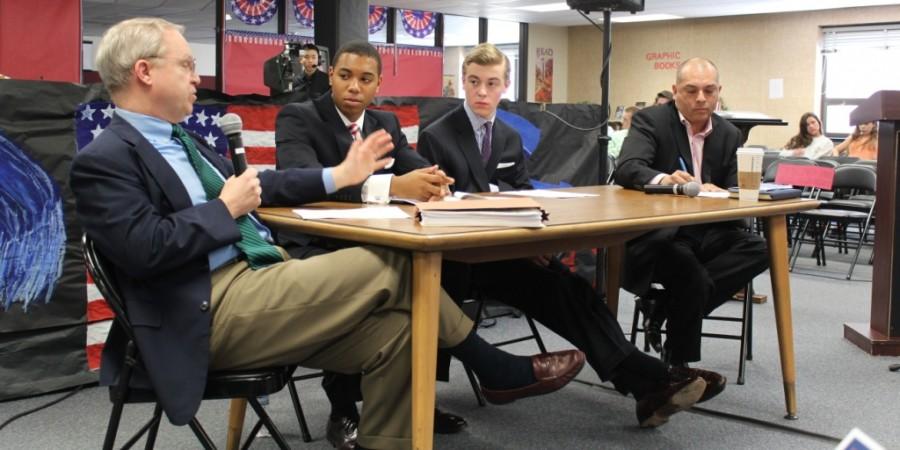12:00 pm: The only underclassmen to present on Case Day, junior Jiho Kim and sophomores Ali Farzad, Ian Beskin and Sean Gordon represented the Langley Young Democrats club. Their presentation was on the topic of voter identification laws in Arizona. All four students felt strongly that Proposition 200, which requires proof of citizenship when registering to vote in Arizona, should be overturned.
“Proposition 200 disenfranchises voters. Denying such a fundamental right [to vote] brings us back to the Jim Crow era,” said Kim.
Beskin added, “The amount of fraudulent voting is infinitesimal compared to the amount of people that would be disenfranchised by stricter voting laws.”
12:15: Six students representing various interest groups participated in a panel discussion led by senior Jenna Smith. Each student had done extensive research on the views of his/her interest group before the discussion.
Senior Brendan McConnaughay spoke on behalf of the American Unity Legal Defense. “Two dogs were registered to vote in New York[once],” he said.
Senior Selma Pulak represented the Election Administrators group, which feels that Proposition 200 should be overturned. “In Wisconsin, 23% of adults 65 and older did not have a drivers license. So they wouldn’t be able to vote,” she noted.
After the panel discussion, McConnaughay felt it went well. “It felt good to provide input on the case as a whole. The interest groups all have such different opinions, and it was interesting to be representing some radical viewpoints. Everybody came through, and had great points.”
12:30: Seniors Kyle Dear and Brad Jeter moderated a discussion between Matt Ames, vice chairman of the Fairfax County Republican Committee, and Cesar del Aguila, chair of the Fairfax County Democratic Party.
Part of the discussion revolved around whether early elections should be permitted.Amesfelt that they should not, saying, “I have a problem with people voting a month out. You don’t know what’s going to come up.”
Del Aguila, on the other hand, approved of early elections. He cited an incident where he tried to vote and his name could not be found on the registrar due to its unusual spelling, and said that allowing early elections would help fix these problems.
1:00: The second student debate of the day took place, with senior Chris Paul moderating and Phil Loria and Charlie Weir arguing whether immigration reform bills should include a path to citizenship.
Loria spoke in favor of leniency for immigrants and giving them citizenship. “The country that prides itself on being a land of opportunity is intolerant of those simply looking for a better life. Instead of blindly deporting immigrants, we should put them on a ten year path to naturalization.”
Weir argued for more protection to American citizens. “As citizens, we all enjoy certain benefits. These benefits do not come without a price. There’s a group of people who do not pay these taxes, and they make up five percent of our workforce.”
1:15: Senior Rachel Stone delivered a speech on the issue of immigration. “We as the United States are a nation of immigrants. It is important that we learn to coexist with each other as we grow in immigration,” she said.
1:30: The focus shifted from immigration to partisan politics, as seniors Allie Sherlock, Ben Parker and Grace Posey delivered a presentation on the psychology of partisan politics. The audience enjoyed several moments of levity during a video of politicians repeating the same phrases over and over.
“Most political arguments stem from blame; this is called attribution,” said Sherlock.
1:45: Finally, in front of a packed room, the nine justices returned to deliver their decision. Senior Greg Adams delivered the majority opinion in favor of the respondent (Cynthia Ding and Mujtaba Wani): that Proposition 200 violated NVRA (National Voter Registration Act), and should be struck down.
“We rule in favor of the Ninth Circuit Court. There is a direct conflict between state and federal laws. This case should be analyzed under the elections clause, and the federal government has the authority to regulate elections,” stated Adams.
The majority opinion was joined by six justices, with two of those justices writing a concurring opinion. The other three formed a dissenting opinion in favor of the petitioner (Nick Hallmark and Michael Osgood).
Senior justice Clayton Kennedy read the dissenting opinion. “It is Arizona’s power and ability to verify the eligibility of voters. If a person filling out a form registered as Donald Duck, the state would have no recourse but to accept it [now]. We find that unacceptable,” he said.
Senior Cynthia Ding, who represented the respondent, was extremely happy with the outcome. “I think that both the petitioner and the respondent (me and Mujtaba) did a really good job. It just came down to how the justices decided to interpret the arguments we made,” she said.
2:00: The three coordinators—Zack Dailey, Jenny Rossberg and Sarah White—took the stage for the final time to deliver closing remarks. Rossberg thanked all of the counsel, justices, guest speakers, committee chairs and AP Government students for their hard work.
“So many people have poured their hearts into making this possible,” she said.


